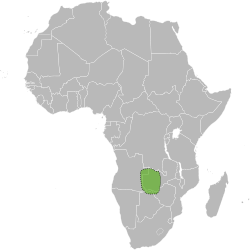Barotseland
|
Kingdom of Barotseland |
|
|---|---|

Proposed coat of arms
|
|

Top: Proposed flag and arms.
Bottom: Map of Barotseland within Africa; orthographic projection |
|
| Common languages | Lozi, English |
| Area | |
|
• Total
|
368,823 km2 (142,403 sq mi) |
| Population | |
|
• 2012 estimate
|
5,153,405 |
Barotseland is a region between Namibia, Botswana, Zimbabwe, Zambia and Angola, and is the homeland of the Lozi people or Barotse, or Malozi as they call themselves who are a unified group of over 20 individual formerly diverse tribes related through kinship, whose original branch are the Luyi (Maluyi), and also assimilated northern Sotho of South Africa who they called Kololo.
The Barotse speak a complex language, Silozi, derived from several languages but primarily Sesotho. Barotseland covers an area of 126,386 square kilometres, but is estimated to have been twice as large at certain points in its history. Once an empire, the kingdom stretched into Namibia and Angola and included other parts of Zambia, including its central Copperbelt Province, south-west of the Democratic Republic of Congo's Katanga Province.
Under the British colonial administration, Barotseland enjoyed relative autonomy from the late 19th-century. The Litunga, the Lozi word for the king of Barotseland, had negotiated agreements, first with the British South African Company (BSAC), and then with the British government that ensured the kingdom maintained much of its traditional authority. Barotseland was essentially a nation-state, a protectorate within the larger protectorate of Northern Rhodesia. In return for this protectorate status, the Litunga gave the BSAC mineral exploration rights in Barotseland.
This traditional constitutional monarchy has Nilotic origins with the kingdom originally divided into north and south. The north being ruled by a man, the King, called the Litunga meaning 'keeper or guardian of the earth', and the south is ruled by a woman, Litunga la Mboela, "Queen of the south" who are directly descended from the ancient Litunga Mulambwa who ruled at the turn of the nineteenth century and through his grandson, Litunga Lewanika who ruled from 1878–1916, with one break in 1884-5, who restored the traditions of the Lozi political economy in the arena of the invasion by the Makololo, internal competition, external threats such as that posed by the Matabele and the spread of European colonialism.
...
Wikipedia
